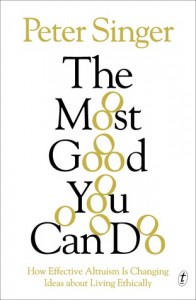 THE MOST GOOD YOU CAN DO
THE MOST GOOD YOU CAN DO
Peter Singer
Text Publishing, March 2015, RRP $32.99
Ever noticed that when your salary increases, your spending also grows, and suddenly you can’t imagine being able to survive on anything less? We adapt to our circumstances, and the adaptation becomes the new normal. It’s a phenomenon that serves consumerist culture incredibly well.
But what if, rather than your lifestyle matching your income, you made a choice about how you want to live, how much money you need to maintain it, and donate all additional funds to charity? The more money you make, the more you can help others. Consider the impact you can have on thousands of lives. This is one of the central arguments within Peter Singer’s The Most Good You Can Do.
Singer’s latest book is a challenge to the assumptions we make about the way we live our lives. Rather than making money to buy things for ourselves, we can make money specifically to give it away. In fact, the more you earn, the more you can give. But when you give, make sure you know what impact you’re making.
Charities have a tendency to pull at heartstrings in order to get donations; it’s a benign form of propaganda. We’re familiar with images of children in impoverished conditions that provoke a pang of sadness. But this image, while emotionally powerful, doesn’t give us any information about whether the outreach programs used by the charity are effective in addressing the needs of the community (e.g. ongoing access to food and water). What we need, Singer argues, is statistical evidence, based on a research question, rigorously tested. We need academic standards, peer-reviewed evidence so we know that the funds we give are making the change we expect.
Numbers are important to Singer and are predominantly used to elaborate upon hypothetical philosophical arguments in order to demonstrate which types of philanthropy are the most impactful. However, unfortunately Singer seems to be unaware of his own biases, which come out strongly in his writing, and can make his pleas for rationality a little difficult to digest. Opinion is often presented as self-evident truth. This is problematic when Singer argues for non-emotional decision-making based on scientific rigor but doesn’t always use empirical evidence within his own material. The few statistics that are provided seem to lack rigor. The basics of empirical data collection are never touched upon, sample sizes, sampling effort, blinding or other experimental design considerations like balanced sampling do not get a look in. The problem is that a mean is… well, meaningless if we don’t know how it was obtained.
There’s also a seeming lack of dimensionality to Singer’s utilitarian arguments which prioritise volume of impact over all other considerations. For example, Singer argues that $100,000 can pay for significantly more treatments for blindness in the third world than it can achieve attendance numbers at the new wing of an art museum. What Singer doesn’t address is that the arts, and in particular storytelling, has been shown to increase empathy levels, which is an important part of a person’s decision to donate to charity. By not addressing people’s higher needs, do we then undermine the potential for their future participation in the movement we are trying to engender?
The Most Good You Can Do is a thoughtful but flawed work. This aside, the book will certainly spark debate, and hopefully encourage research in its wake. It would probably make an excellent title for a non-fiction book group: if nothing else, debate one way or another is all but assured.


Nice review!